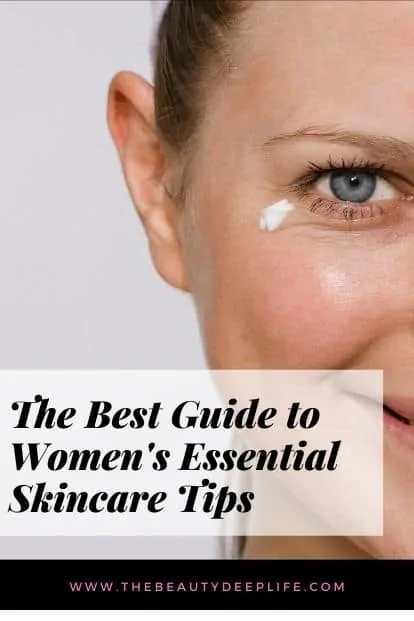
Essential Skincare Tips For Every Woman
What is the best thing to do for your skin?
When it comes to our skin, the truth is nothing boosts our confidence level like radiant, healthy-looking skin achieved through healthy skincare practices. And nothing can jab at your self-esteem like a bad complexion, breakouts, wrinkles, dark spots… you name it!
I can speak firsthand to this myself having experienced adult acne, hyperpigmentation, and in the most recent years, the unhappy emerging of fine lines and wrinkles.
You look in the mirror and think, “WHAT HAPPENED!? Where did that pimple come from? Why do I look so tired and haggard? Who is this woman staring back at me??”
My Skincare Story
When we look our best, we feel our best, and unfortunately, when we don’t look our best, we can feel our worst.
I can’t tell you the number of times I avoided being social when I was having a major breakout. In my mind, I knew it was silly to feel that way, to let it affect me going out, but the truth is it did.
I felt self-conscious and insecure, and honestly, I worried people would judge me. Looking back, it seems ridiculous, but in those moments, my skin had a huge impact on my self-esteem.
After the pimples faded, the dark marks appeared. So, then I became hyper-focused on using makeup to cover them up before leaving the house. If I thought there was a chance of running into anyone I knew while out running errands, that meant I needed to do some serious camouflaging.
But when the fine lines, wrinkles, and enlarged pores appeared, it then became abundantly clear to me it was time to start implementing some new skincare habits. It was time to start a new skincare routine that would help me to take better care of my skin, pronto!
How do I make my skin look better?
Taking care of your skin can sometimes involve switching up daily habits, making lifestyle changes, and fueling yourself with more knowledge. When we know better, we do better!
What I realized was though I knew quite a bit about skincare and products, having tried countless brands over the years, I didn’t know everything. As far as health and wellness, I had practiced a pretty healthy lifestyle for years, but there were some things I could improve, which brings me to the top eleven ways to take better care of your skin.
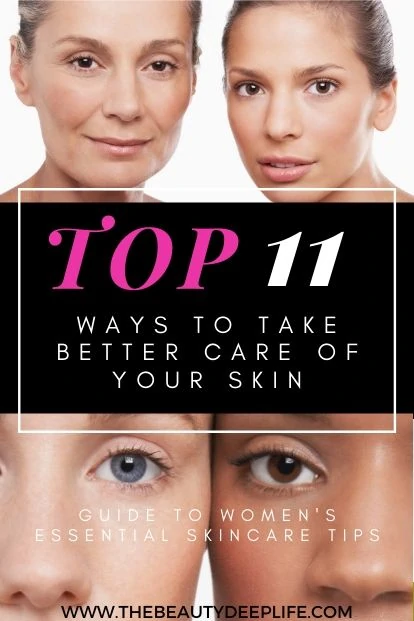
TIP 1: Minimize the stress in your life
When you stress, your body produces too much cortisol, which can trigger adult acne and skin sensitivities like redness, irritation, dryness, rosacea, psoriasis, and eczema.
It also has a dirty hand in speeding up the aging process of your skin. Fine lines, wrinkles, dullness, and under-eye circles can be pushed into making an early and unwanted appearance on your face.
Similarly, stress causes your body to redirect nutrients, oxygen, and blood to the most important and vital organs. Though we may think our skin, hair, and nails are important, ladies (wink), they are not vital organs needed for survival.
This means your skin, hair, and nails all lack some of the essentials they need to thrive and appear healthy-looking.

- For more tips about stress, your skin, and solutions to help…
TIP 2: Make sure you are getting enough sleep every night
How many hours of sleep do you get each night?
You should aim to get 7+ hours of sleep every single night. When you aren’t getting a sufficient amount of sleep, your body produces too much cortisol.
We already discussed how excessive cortisol can impact your skin in tip #1. But also, getting a good night’s sleep allows the body to produce HGH (human growth hormone). This is the hormone responsible for the production of collagen. It aids in both skin cell turnover and elasticity.
Furthermore, sleep is the time when your skin cells can repair, heal, and recover. So, ladies, don’t skip out on this much-needed time for beauty!!
- Check out our tips for getting a better night’s rest here!!
TIP 3: Pay attention to the way you sleep each night

Do you sleep on your side, your stomach, or your back?
Sleeping on your back should be your #1 goal. If you sleep on your stomach or your side, you could be contributing to signs of aging in your skin. The weight of your body and the pressure on your face from sleeping face down or on your side can make facial expression lines and wrinkles more pronounced. More specifically, it can cause a deepening of these lines.
So, start on your back, ladies, and if you somehow shift to face down or your side throughout the night like I sometimes do, once you realize it, just turn back over. You’ll get the hang of it!
TIP 4: Be mindful when it comes to sun exposure and protection
You should wear sunscreen daily because, truly, nothing ages your skin like the sun! And if you forgo sunscreen, the damaging effects of going without it will inevitably become apparent.
So, whether you are 20+ or 60+ years of age, it’s best to be preventative and use a broad-spectrum UVA/ UVB sunscreen. Equally important, you should reapply as needed throughout the day.
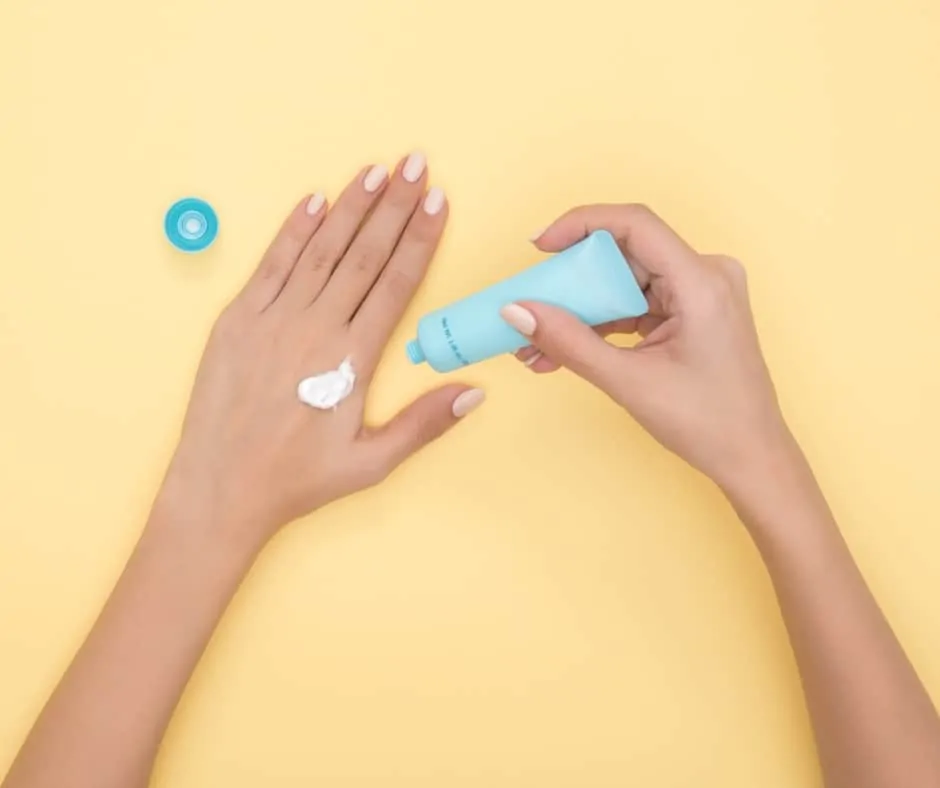
TIP 5: Fuel your body with the right things that promote healthy skin
Eating healthy will give your body and, subsequently, your skin the nourishing ingredients it needs. Supplements are great but getting key vitamins and minerals is always better from a direct food source.
Therefore, you want to focus on foods with antioxidants to fight free radicals that contribute to sun damage and aging. Also, ensure you are getting enough Vitamin A, E, D, and C from what you eat. And, of course, get in some Omega 3 and 6 fatty acids!!
- Find out what to eat for healthy skin!
TIP 6: Avoid excessive dieting
Sometimes, dieting can prevent your skin from getting the nutrients it needs if a calorie restriction is too severe. For this reason, it is advised that you consult a doctor when you create a diet plan.

Another thing to keep in mind… Do you tend to have an ongoing repetitive cycle of losing weight and then gaining a lot back?
This type of dieting puts a great deal of stress on your skin with the expanding and contracting process again and again. As a result, after some time your skin can start to lose elasticity.
Lastly, when you lower your body fat, you can lose fat in your face as well, which can become a problem when your body fat gets too low. It’s important that you maintain just enough body fat to keep your face from becoming too gaunt and, subsequently, from looking older.
TIP 7: Limit alcohol consumption and drink in moderation
A glass or so here and there is nothing to worry about. But if you tend to binge drink and find yourself inebriated on a regular basis, it may be time to slow it down.

Alcohol can have damaging effects on your skin. With time, it can cause broken capillaries, resulting in permanent redness of the face, particularly the nose and cheeks areas.
Alcohol also causes dehydration, prevents the stomach’s full absorption of nutrients your skin needs, and inhibits your body’s ability to fight off free radicals.
TIP 8: Get regular exercise
Focus on getting a minimum of 20-30 minutes of exercise 3-4 days a week. Exercise increases circulation in the body, which, therefore, allows crucial nutrients to be directed to your skin cells.
Additionally, exercise is a great way to reduce stress and, thus, reduce excessive cortisol production. As mentioned before, in tip #1, cortisol can have a negative impact on your skin.

TIP 9: Don’t smoke
Smoking increases sagging, wrinkling, and signs of premature aging in the skin. It restricts the circulation needed for getting oxygen to the skin cells, lessens collagen production, and prevents protection from free radicals.
TIP 10: Never go to bed with makeup on
Yes, I know this one can be hard after a late night out or a long day’s work, but it is essential. If you do not remove your makeup at night, it will settle into your pores, which over some time can cause your pores to appear larger.
Additionally, not removing before bed can lead to clogged pores, breakouts, skin texture issues, and signs of premature aging (fine lines and wrinkles).

As you sleep, the things your skin came in contact with for the day like environmental aggressors/pollutants and the ingredients from your makeup work their way into your pores overnight. As a result, collagen and elastin begin to break down, and bacteria can grow.
TIP 11: Find the right skincare routine for your particular skin type & concerns
When caring for your skin, you want to find a routine compatible with your skin type, and based on specific skin concerns. Knowing these things can help you to narrow down on a routine that will be effective without causing unnecessary issues or irritation.
Let’s say, for example, you recently started having semi-sensitive skin (type), but you want to address signs of aging (concern).
With sensitive skin, you can’t immediately jump into using just any anti-aging products out there. Microdermabrasion products or retinoids are great for anti-aging, but they could cause major problems for someone with sensitive skin.

Subsequently, to address signs of aging, you may have to take a different route and adapt your skincare routine a bit. For example, I often suggest my clients use products to heal their skin’s lipid barrier first and secondly, use different anti-aging ingredients like hyaluronic acid and peptides.
What if you don’t have any particular skin concerns?
In that case, you should still consider using a routine that protects from UV rays, is preventative towards skin damage, and is preventative towards skin aging. You want to be proactive when it comes to signs of aging. It is best to prevent problems rather than wait for them to emerge.
What is a good skincare routine?
So, what makes for a good skincare routine? How do you know what’s right for you? Well, let’s first look at some essential factors in making this decision.
- I always tell my clients, first, what are your concerns when you look in the mirror? What’s your number 1, 2, 3, etc. if you were to put them in order of importance. Write them down.
- Second, if you don’t have a specific concern, then what’s your goal? Healthier skin, glowing skin, or maybe to look as young as you possibly can for as long as you possibly can?
- Third, what is your skin type? Is it sensitive, dry, oily, acne-prone, combo, or normal?
Once you have identified your primary skin concerns, goals, and skin type, we can more easily move on toward making the right choices for your skin. It is crucial to use a skincare routine that includes ingredients that are the best at addressing your specific concerns, whether it’s acne, dark marks, lines, wrinkles, pores, dryness, redness, dullness, puffy eyes, or undereye circles, etc. and at achieving your skin goals.
Yet, you want to be sure to take your skin type into consideration before making any final decisions. Finally, once a skincare routine is chosen, you want to implement it both day and night. Staying consistent should be a priority.

How can I take care of my face daily?
Your daily skincare routine should consist of several basic steps. You want it to include a cleanser, moisturizer, SPF, and eye cream.
However, if you would like for your routine to fully address your concerns and goals, you will likely need to add in a few additions like a toner, treatment products, weekly exfoliants, etc., ultimately with the intent being to use more targeted active ingredients.
Pro Tip: For those with sensitive skin, keep in mind you should avoid using toners.
General Cleanser Tips:
- Always look for cleansers made for the face, not the body.
- Avoid soap and use a cleanser made for your skin type and made to address your specific concerns.
- Apply to face with fingertips, gently wash, rinse with warm water, and if needed, pat dry on a clean towel.
- Avoid washcloths! They harbor bacteria and can be too rough on the skin.

Sensitive skin, dry skin, and those suffering from redness
- Look for a cream cleanser that says “gentle” on the label.
- Avoid anything foamy with fragrances, soap, and dyes.
- For dry skin, following your cleanser, while the skin is still damp, try applying your moisturizer. This will help your skin seal in extra moisture.
Acne or acne-prone skin
- Use a cleanser with acne-fighting ingredients like salicylic acid, alpha-hydroxy acids, and/or sulfur.
- For more on acne and how to prevent it.
Oily skin
- You can use a foaming cleanser as long as it is oil-free.
Discoloration, dark marks, or dull skin
- Look for a cleanser that has chemical exfoliants with ingredients like alpha hydroxy acids, vitamin C, and/or salicylic acid.
For fighting signs of aging
- A cleanser that exfoliates is good; you just don’t want to overdo it or dry your skin out.
- Make sure the products you use after cleansing put moisture back into your skin (moisturizer, lotions, or serums).
Normal to dry skin
- If you are in the normal to dry range, you want to avoid cleansers that are too bubbly or foamy. These can be excessively drying and strip your skin’s moisture barrier.
Normal to oily skin
- For normal to oily skin, you can try a foaming cleanser. Just be sure you don’t go to the opposite extreme and dry your face out.
Moisturizer Tips:
Everyone can benefit from using a moisturizer, especially at night. Acne-prone and oily skin types should look for ones that are lightweight and oil-free.
SPF Tips:
Everyone needs to use a sunscreen, whether it is sunny and warm outside or not. Some moisturizers may already come with an SPF in them. Acne-prone and oily skin users opt for lightweight and oil-free options. Those dealing with discoloration and dark marks should use an SPF 45 or higher.
Eye Cream Tips:
Everyone can benefit from using an eye cream whether it’s addressing concerns or preventing concerns. Your eyes are the first place on your face to show signs of aging. The skin around the eyes is the thinnest, most fragile skin on the face.
You need to use a cream made just for the eyes, not for the full face. While creams used on the face can be safe for the majority of the skin on your face, they may not be suitable and safe for the eye area. Eye creams need to be tested by ophthalmologists to determine safety for the eye area.
- Are dark undereye circles a concern of yours? Check out some of your options for an eye cream with targeted ingredients.
- Additional eye cream tips for tired-looking eyes: puffiness, eye bags, fine lines, & wrinkles!
How can I improve my skin overnight?
Most people neglect their skin at night by not following a nightly skincare routine. But the truth is your skin is most receptive to skincare products at night, while you sleep.
Therefore, you want to be sure to use a nightly routine that allows you to restore, treat, rejuvenate, and significantly improve your skin.
Additionally, targeted treatment products work the best overnight. So, if you are looking to improve your skin and address skincare concerns, this is the perfect time to do just that.
You should start with a cleanser that has the best ingredients to tackle your primary skin concern (refer to the cleanser tips above under “how can I take care of my face daily” listed above if you need to).
All skin types, except for sensitive skin, would then benefit from adding in a toner. Your toner can also contain targeted ingredients for addressing a specific concern.
Next would be treatment products (serums, gels, possibly lightweight lotions) with targeted ingredients (refer to the “skincare best ingredients checklist” of this article and download if you need to), followed by a moisturizer.
Targeted Treatment Product & Moisturizer Tips:
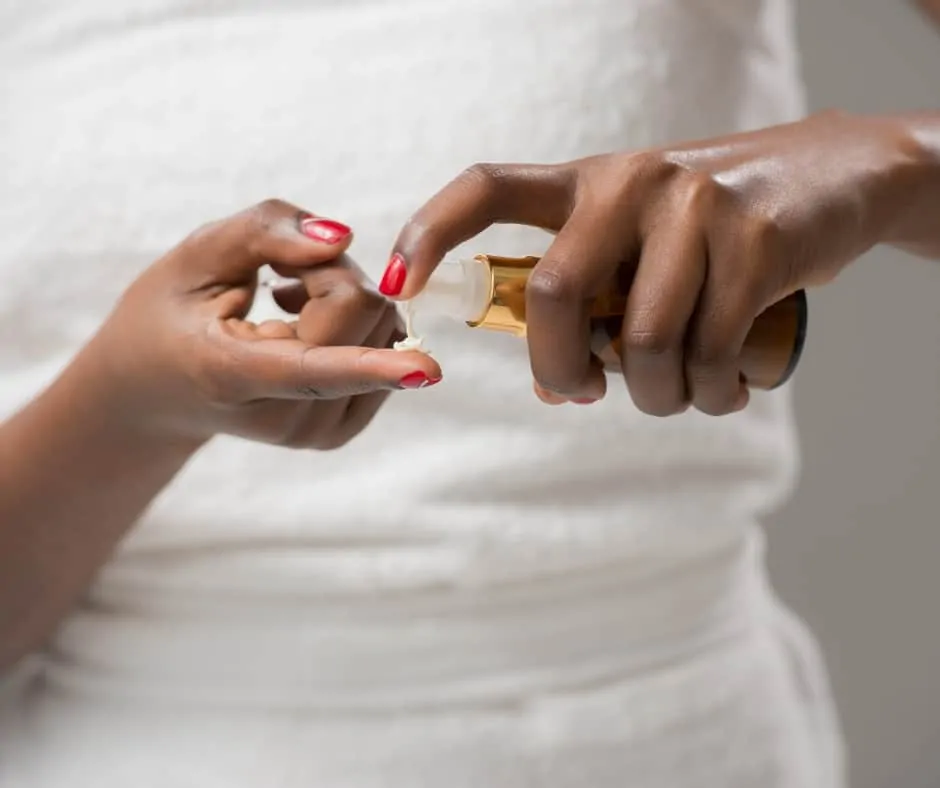
- Sometimes, ingredients in products used for anti-aging and acne (retinol and glycolic acid for example) can make the skin more sensitive to the sun, which is why it is better to use them at night.
- Those with dry or sensitive skin should use this time to restore their skin’s moisture barrier using ingredients like ceramides, dimethicone, or allantoin.
- If you are using peptides for anti-aging, they work great at night since they aid in collagen production, plus restore and repair the skin.
- Lastly, ingredients geared towards helping with discoloration can work better at night since there is no sun exposure. When dealing with discoloration and dark marks, the sun is not your friend, Beauties!
Learn why skipping a nighttime skin routine could be the biggest mistake you make with your face here…
What order do you apply skincare products?
First things first, using products in the correct order allows them to be more effective. Secondly, when applying skincare products, each product should prepare your skin for the ingredients of the very next product. Thereby, creating a layering effect.
When you apply step by step, you should be certain that the active ingredients in each of the products are compatible with one another when applied in that particular order.
For example, let’s say you apply product “A” to your skin and follow it with product “B”. But “A” has certain ingredients in it that block some ingredients in product “B”.
Because you applied product “A” first, your skin will not receive the important ingredients in product “B” that make it most effective. You see, the order in which ingredients, thereby products, are applied to your skin impacts their ability to absorb into and work for your skin.
For several years, I made the mistake of creating my own hodge-podge skincare routine. I read reviews on various products from a variety of different brands. Based on those reviews, I used one brand’s cleanser and toner, another brand’s serum, while still a third brand’s moisturizer/SPF.
They all were labeled as anti-aging products, and all from prestigious brands, so I figured what’s the harm??
Well many hundreds of dollars later with no real visible results whatsoever I learned my lesson. Yes, they were all anti-aging products, but since they came from different brands, their ingredients weren’t technically designed to go together and were not therefore tested for compatibility.
The ingredients weren’t compatible, so they counteracted each other, and subsequently, they were applied to my skin in an order that caused them to cancel each other out and become ineffective.
So, how do you make sure ingredients are compatible in the order in which you apply them?
Use products made by the same brand and already packaged and designed to work together. Otherwise, you risk wasting time, energy, and money as I did. Assuming products come from the same brand and were made to go together, the order can generally be as follows…
Morning order of skincare products
- Cleanser
- Toner
- Eye Cream
- Treatment Products – serums, gels, and/or lotions (treatment products are products designed to address a skin concern or goal)
- Sunscreen
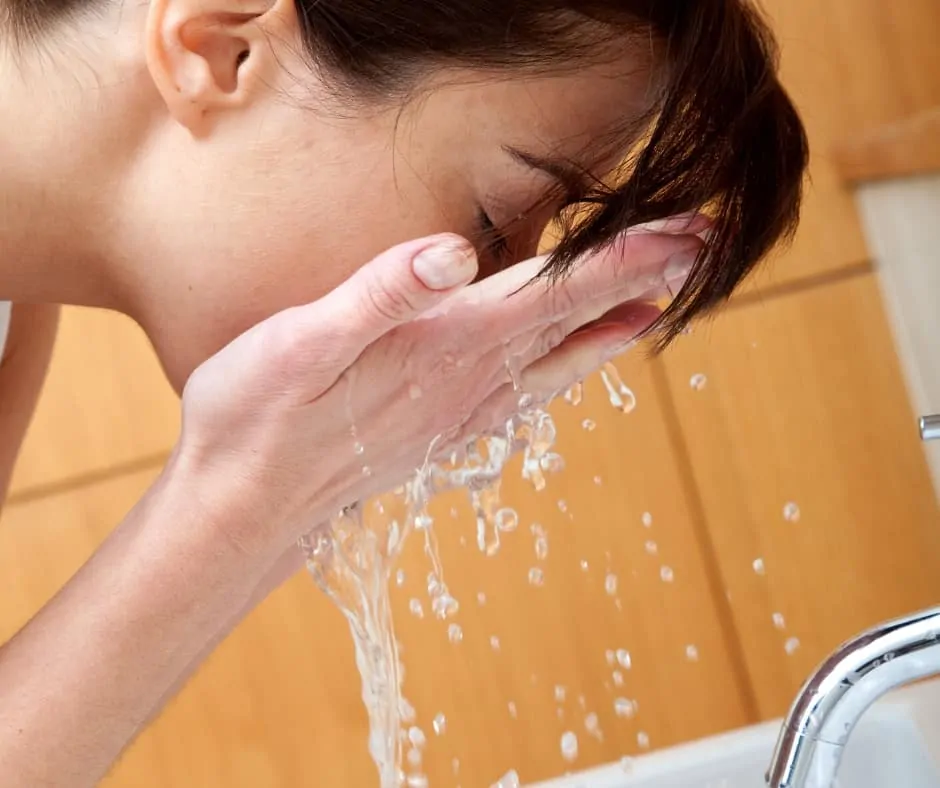
Evening order of skincare products
- Makeup Remover Wipes
- Cleanser
- Toner
- Eye Cream
- Treatment Products – serums, gels, and/or lotions (treatment products are products designed to address a skin concern or goal)
- Night Moisturizer
Pro Tip: A general rule of thumb is after cleansing and toning you should apply products from thinnest to thickest. For example, serums first, gels second, and lotions third.
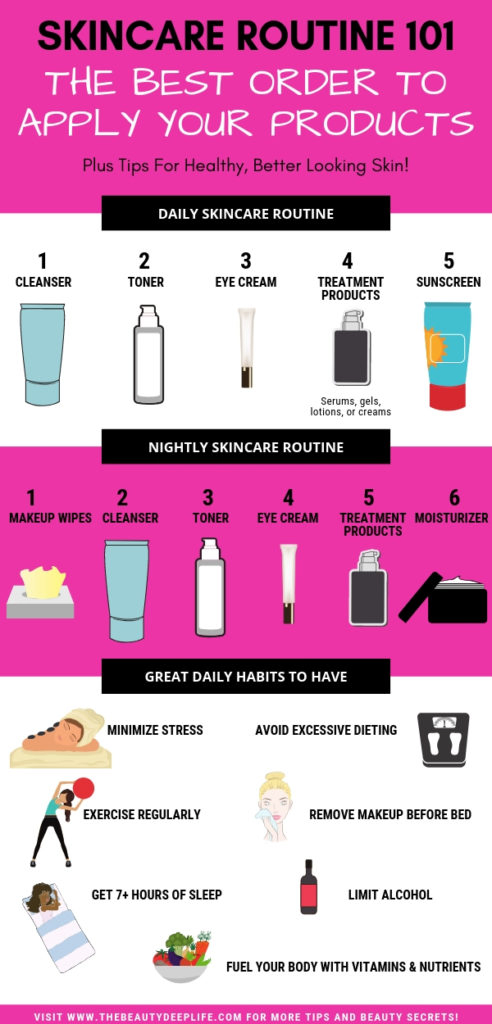
Common Questions/FAQ About Skincare
At what age should you start a skincare routine and start using skincare products?
Young women should start using a routine in their early 20’s. Some may need a routine to address concerns like adult acne, hyperpigmentation, or sensitivities. But even if they don’t have any major skin concerns, they should at least be proactive and start doing things to prevent signs of aging.
It can never be too soon to take preventative measures and introduce healthy skincare habits into your life. If you are in your 20’s the things you use on your skin now can set you up for success into your 30’s and beyond.
Most importantly, whether in your 20’s, 30’s, 40’s, 50’s, 60’s and beyond…you can control and actually slow down the aging process of your skin with what you do today.
At what age should you start using an eye cream?
You should start using an eye cream in your 20’s. Your eye area is the first place that can start to show signs of aging. Therefore, it’s important to start giving this area a little TLC early on. If you are in your 30’s and haven’t started using an eye cream, you’ve got a little catching up to do…so start now Beauties!
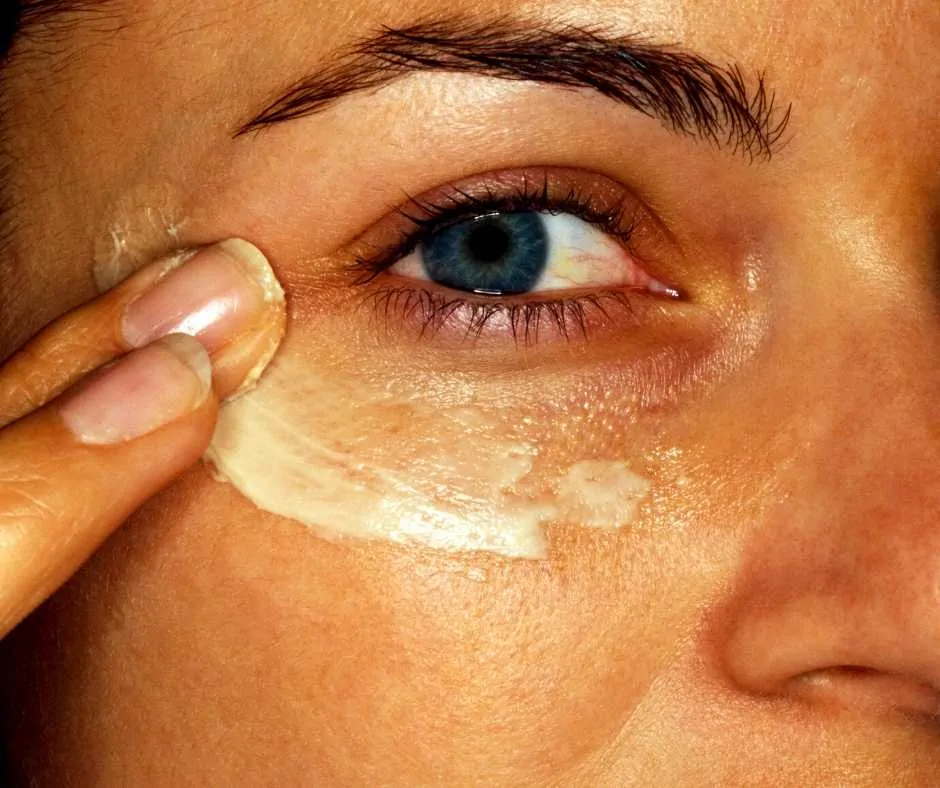
What is my skin type?
Knowing your skin type is essential to both makeup and skincare. When you know your type, you can best determine what products to use and what to stay away from.
- Sensitive skin: If you have sensitive skin, you may notice dryness or redness. Your skin will tend to get, easily irritated or inflamed. In fact, you may notice certain products make your skin burn or itch when they encounter your skin. You may also notice tiny pin size whiteheads representing the fact that you have a compromised lipid barrier.
- Normal skin: Normal skin…the lucky ones! You will have clear and equally balanced skin overall.
- Acne-Prone: If your skin is acne-prone, you will have a tendency to break out easily due to stimuli like trying new products, hormones, or stress.
- Dry skin: There is a chance you may have sensitive skin. Your dry skin could be the result of a compromised lipid barrier. For dry skin, you may notice more fine lines, a rough texture, or flaky skin.
- Combination skin: You suffer from dryness and oiliness. You may notice oily areas like the chin, forehead, and nose. Yet you may also notice dry patches on different areas throughout your face or dryness specifically on the cheeks.
- Oily skin: You will notice more shine to your skin and perhaps notice enlarged pores. Your skin may seem to appear greasier as the day goes on. Subsequently, you find yourself having to use powder or blotting papers to control the shine.
What should I look for in anti-aging products?
When it comes to products to address the signs of aging, you want to look at several factors: age, whether the intent is to prevent or reduce signs of aging, and which specific signs of aging you are looking to address…(fine lines, deep wrinkles, sagging skin, large pores, dullness, or a combination thereof).
Generally speaking, you want products that will renew what your skin is losing or missing, while fending off the unfortunate processes that begin to occur with aging. You want products that will protect the skin from environmental damage (sun, free radicals, etc.), slow down the breakdown of elastin and collagen, boost collagen production, refine pores, rejuvenate the skin’s surface, assist skin cell renewal, and speed up skin cell turnover.
Look for products that have the best anti-aging ingredients (like Vitamin C, E, peptides, retinol, and hyaluronic acid).
How can I keep my skin clear from acne breakouts?
Adult acne sucks, believe me, I know having dealt with it myself. But there are things you can do that will reduce breakouts and ultimately get you the clear skin you’ve been desiring.
- First and foremost, find a skincare routine made for adult acne. Look for ingredients like benzoyl peroxide, salicylic acid, sulfur, and/or glycolic acid. Be consistent with your skincare routine; acne takes time. The pimples you see today have been hiding under your skin, dormant, just waiting for the perfect moment to make their infamous debut!
- Don’t over-wash your face, stick to twice a day. Over-washing causes dryness, which can create excess oil production, leading to more breakouts. Also, you should avoid washcloths as they are a breeding ground for bacteria.
- Always wash and sanitize your hands before touching your face. This sanitizing rule goes for almost everything that touches your face…pillowcases, makeup brushes, sleep masks, cell phones, etc.
- When picking makeup products, look for oil-free, non-comedogenic options (won’t clog pores).
- Looking for more ways to fight acne? Check out this post on 27 winning ways to stop acne!
How can I make my skin spotless and free from dark spots?
The best way to get rid of dark spots and have spotless skin is to find a skincare routine created specifically with ingredients for addressing hyperpigmentation and using it consistently every day for several months to a year. Hyperpigmentation is not something that can be fixed quickly. Usually, with dark marks, age spots, or sun damage, you are dealing with many affected deeper layers of the skin. Therefore, patience is key! You will need to focus on exfoliation, treating, and protecting with sunscreen.
- First, and foremost, let your cleanser and toner be sources for exfoliation. Look for ingredients like retinol, alpha hydroxy acids, Vitamin C, lactic acid, citric acid, and/or salicylic acid. Just be sure to not over-exfoliate.
- Next your treatment product can help (serum, cream, or lotion) deliver specific beneficial ingredients. This product can have ingredients like Vitamin C, Kojic Acid, Retinol, Licorice Extract, Mulberry Extract, and/or possibly low dose Hydroquinone.
- Last, is your sunscreen. This needs to be high like 45+ protection; otherwise, you risk decreasing all the progress you make with your routine. Just one day without protection is enough to set you back months. Also, it needs to be worn every single day whether it’s cloudy or the sun is shining. Whether you are only outside for a few minutes, all day, driving or sitting near a window. UVA rays are powerful no matter what!
What foods and supplements are good for my skin?
My golden rule for this is to try to find food sources first, supplements second. It’s far better to get nourishment for your skin from food. I plan to go into this topic in more detail in another post soon, but for now, here are some preliminary tips that can help.
Incorporate Omega 3 & 6 Fatty Acids from foods like salmon, tuna, walnuts, flaxseed, halibut, tofu, pumpkin seeds, sunflower seeds, avocados, olives, oysters, and soybeans.
Try to get in Vitamins A, C, and E from food sources like fresh fruits and vegetables. For Vitamin A: Carrots, Papaya, Spinach, Sweet Potatoes…Vitamin C: Pineapples, Papaya, Avocado, Blueberries, Sweet Potatoes, Strawberries, Oranges …Vitamin E: Almonds, Avocado, and Sunflower Seeds.
You also want to make sure you are getting enough Vitamin D3, Folic Acid, Iron, Magnesium, and Calcium. If you aren’t, look for a multivitamin to supplement.
- Looking for a complete list of foods and supplements that are good for your skin? Check out this post about healthy, glowing skin!
How do I know which ingredients my skincare products need most of all?
Simple… First, figure out your #1 skin concern and your goals. Second, determine your skin type. Third, just use the best ingredients checklist to narrow down on your options when product shopping! Print it out, take it with you, and compare it with the product labels.
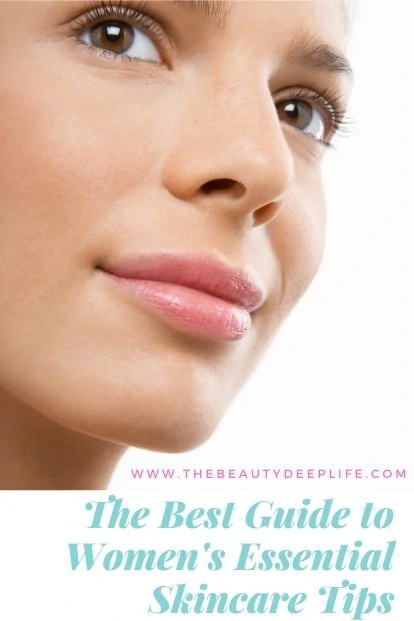
Essential Skincare Tips Wrap-up!
When it comes to taking care of your skin, the best thing to do is to start implementing healthy lifestyle habits. Also, finding a skincare routine for daily and nightly consistent use is crucial.
When looking for that routine, keep in mind our tips about skin type, skin concerns, and skin goals. They all need to work synergistically together.
Look for products made to go with each other with compatible ingredients, so you can avoid the mistakes I made. You should not waste your time, money, and energy on something ineffective. Read the labels, gain some knowledge. And if all else fails, you can always ask me for help.
Use the tips in this post about essential ingredients to look for in your cleanser and treatment products. Apply your products in the correct order and never forget that sunscreen! Soon you will be on your way to healthy, gorgeous skin!
Would you like a FREE skincare consultation?? Click here to reach out.
Related Skincare & Beauty Articles:
- 27 Winning Ways To Stop Acne!!
- Tired-Looking Eyes: 13 Fixes You’re Sure To Love!
- How To Have Healthy Glowing Skin: 7 Expert Tips
- Incredibly Simple Ways To Hide Dark Circles
- How To Minimize Pores On Face: 11 Easy Ways That Work Like A Charm!
- How To Care For Dry Winter Skin: Finally End Your Winter Skincare Woes



Good post, covered all aspects of the routine.
thanks, glad you liked it!!